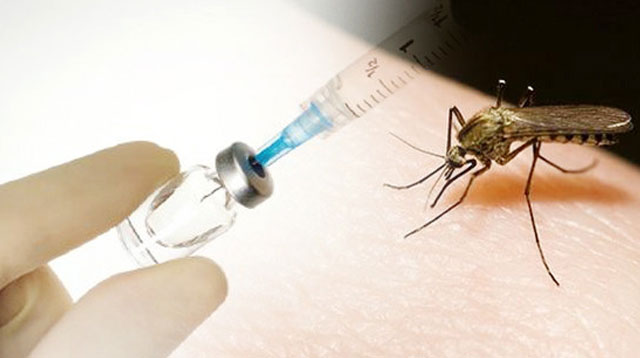
Dengue virus is transmitted by Aedes mosquitoes and infects over 390 million people globally each year causing severe flu-like illness. Over 2.5 billion people live in areas at risk of dengue transmission across 120 countries. There are four different but related types of dengue virus that can cause disease in humans, known as DENV-1, DENV-2, DENV-3 and DENV-4. Infection with one type usually provides lifetime immunity to that type but only short-term protection against the others. Subsequent infection with a different dengue virus type increases the risk of developing severe dengue. There is no specific treatment for dengue and management involves maintaining hydration and treatment of symptoms. First Dengue Vaccine: CYD-TDV The first dengue vaccine to receive regulatory approval was Sanofi Pasteur's CYD-TDV Dengue Vaccines called Dengvaxia. It took nearly 30 years of research and testing to develop this tetravalent live-attenuated vaccine containing the four dengue virus serotypes. Large scale efficacy trials involving over 30,000 children across Asia and Latin America found the vaccine provided significant protection against dengue fever. It was approved for use in 20 countries including Mexico, Brazil, Philippines and Indonesia based on these results. However, further analysis of long term efficacy data raised concerns. The vaccine was found to increase the risk of severe dengue in children who had not been previously infected by a dengue virus. As a result, the WHO no longer recommends it for children with no prior dengue exposure and its use is restricted. This highlighted the complexity of dengue immunology and the need for better predictive tools and biomarkers to identify high-risk individuals. It also showed the importance of following vaccine recipients long-term to monitor safety and efficacy. Progress on Second Generation Vaccines Given the limitations of the first dengue vaccine, second generation dengue vaccines with improved safety and efficacy profiles are currently under development. Takeda's TAK-003 vaccine is a live attenuated tetravalent vaccine which completed phase 3 trials involving over 20,000 subjects across Asia and Latin America in 2019. Interim analysis showed overall efficacy of 80.2% against virologically confirmed dengue. The vaccine was well tolerated with no safety signals. Takeda is working towards regulatory submissions in dengue endemic countries. The U.S. NIH is also sponsoring development of a recombinant subunit vaccine called TV003/TV005. It uses dengue virus premembrane and envelope proteins which self-assemble into virus-like particles. Phase 2 studies in over 4,000 subjects across U.S. and Latin America found it to be safe and highly immunogenic. A global phase 3 efficacy study involving over 20,000 children is ongoing. Interim data expected in 2023. These second generation vaccines aim to provide balanced protection against all four DENV serotypes without the risk of disease enhancement seen with CYD-TDV. Dengue Vaccination Challenges While progress is being made, developing a safe and effective dengue vaccine faces unique challenges compared to other vaccines. Dengue has four different serotypes and protective immunity against one type does not guarantee protection against others. There are also knowledge gaps in fully understanding disease pathogenesis and correlates of protection. As seen with CYD-TDV, long term safety needs close monitoring due to complexity of sequential secondary DENV infections. Other practical challenges include the need for tetravalent formulation, cold chain logistics in tropical regions, screening eligibility and schedules for booster doses. Additional considerations are high dengue transmission rates affecting vector control and difficulty to conduct large phase 3 efficacy trials needed for licensure. Pricing and implementation strategies would need to balance costs and public health benefits given competing health priorities in endemic countries. Continued cooperation between researchers, manufacturers, international organizations and endemic countries will be vital to overcoming these gaps and challenges. Dengue causes significant global health and economic burden. While the first dengue vaccine approval was a major achievement, it also highlighted the complexities of dengue virology and the need for long term safety follow up data. Second generation live-attenuated and recombinant subunit vaccines currently undergoing phase 3 testing show promise to deliver a more balanced protection without safety issues. However, producing an ideal dengue vaccine still presents scientific and public health challenges. Careful evaluation of efficacy, safety and implementation considerations will be important to maximize the benefits of these new generation dengue vaccines.
Get this Report in Japanese Language- デング熱ワクチン
Get this Report in Korean Language- 뎅기열 백신
About Author-
Alice Mutum is a seasoned senior content editor at Coherent Market Insights, leveraging extensive expertise gained from her previous role as a content writer. With seven years in content development, Alice masterfully employs SEO best practices and cutting-edge digital marketing strategies to craft high-ranking, impactful content. As an editor, she meticulously ensures flawless grammar and punctuation, precise data accuracy, and perfect alignment with audience needs in every research report. Alice's dedication to excellence and her strategic approach to content make her an invaluable asset in the world of market insights.
(LinkedIn: www.linkedin.com/in/alice-mutum-3b247b137 )

































